Summer 1 Reflective Blog
When I received the email notifying me of my acceptance into the 2021 cohort of Laidlaw Scholars in Trinity, I was over the moon. My project, exploring ‘The Impact of the Inability to Access Period Products on the Irish Educational Experience’, is one that I am incredibly passionate about. The issue of the inability to access period products, both due to period poverty and societal stigma, and the impact that this has on education in Ireland is one that is incredibly important. Whilst Ireland has statistics on absenteeism due to menstruation and menstrual education, there is little to no qualitative data detailing the experience of Irish menstruators and how the inability to access period products has impacted on their education. I believe that the research is hugely socially important and plan to use it as an evidence-based way to advocate for free period products, which is an incredibly exciting opportunity that the Laidlaw Foundation has afforded me, whilst also allowing me to grow as a researcher and leader.
Finding a Supervisor
Finding a supervisor was perhaps one of the most daunting parts of my project. Whilst I was incredibly passionate about my research project, I was not confident in my ability to sell myself and the project to an accomplished academic. I reached out to my supervisor, the wonderful Dr. Ann Nolan, Assistant Professor of Global Health, having read about her research in sexual and reproductive health. I read that she had previously worked in global policy development with UNICEF and social science research within the Oireachtas, and thought that her experience with reproductive health research as well as policy development would help me develop both my qualitative research skills and help me use my research to make real change within Irish public policy.
Dr. Nolan was an incredibly encouraging force. She gave me expert guidance on my project, helping me shape it from my original research idea to gather quantitative data to a refocus on qualitative data, in order to fit the timeframe and ensure that the data received was original and valuable. She advised me through the ethics and data approval process, whilst also encouraging me to learn the process through trial and error to ensure that I gained the necessary skills for any further research I may complete. Whilst this process was a lengthy one, I learnt so much from Dr. Nolan and hope to someday use the skills I learn through the Laidlaw Scholarship Programme to mentor and support young academics in the same way she supported me.
The Interview Process
The interview process was an emotional but rewarding one. I interviewed 11 participants on their inability to access period products and how this impacted their education. The interviewees ranged from people who had been caught without period products once or twice in school, to people who experienced a long-term inability to access these products as they could not afford them. It was an incredibly diverse group of interviewees. I spoke to menstruators of different races, gender identities and religious backgrounds, however, they were all united by a yearning for change. Hearing from the participants about their experiences and their enthusiasm to ensure that no one had to suffer the same experience made it so clear that this was an issue that needed to change, an issue that I needed to help alleviate.
Outputs & Resulting Advocacy
Often, when period poverty is reported within the media, it receives backlash from the general public. On recent posts by Senator Lorainne Clifford Lee, outlining the issue of period poverty in Ireland, comments included “Ae [sic] womens [sic] private matters no longer private”, “grow up you obviously don't know anything about poverty,” and “for god sake such a load of bull.” It is clear that many people in Ireland do not understand the impact the inability to access period products can have on menstruators.
Through my research I aimed to change this, to give those who have experienced this issue a platform to anonymously share their experiences and recommendations, to try to bring about some form of social or policy change. In the study, one participant noted that they used cut up “pampers type nappies and stuff” in place of period products. Another participant noted that “when you're using tissue (in place of a period product)… it's constantly in the back of your head, like ‘what if I leave, what if it goes all over me’ and you're just not able to concentrate as well”. Another menstruator reported that “there was one time that I had nothing on me (and) I couldn't afford anything so I got the bus home, and when I was walking through the bus to my house, I noticed that it had like, leaked all down my leg… I was just so upset about it so I'd always leave for the fear of like, people being able to see that.” The data collected in this study illustrates that this is a real issue for menstruators in Ireland, impacting their education as well as their overall standard of life.
I hope to use the data I collected to help influence policy in this area. I have arranged to meet with Senator Clifford Lee, a politician whose Free Provision of Period Products Bill (2021) will be in the second stage in the Oireachtas this September. I also wish to use the data to inform the public on the necessity for free period products and the huge change that this would make in the lives of menstruators in poverty. This is an issue that is so incredibly important, but those who experience it often seem they cannot speak up on it due to the double taboo of menstruation and poverty. The participants also offered recommendations on how to best solve the issue of the inability to access period products whilst in school and college, which I hope is used to form evidence-based policy for the alleviation of period poverty in Ireland.
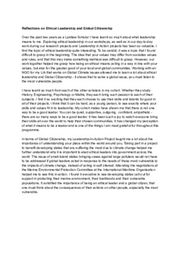
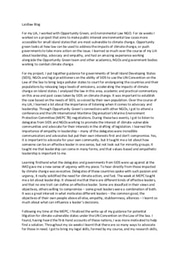
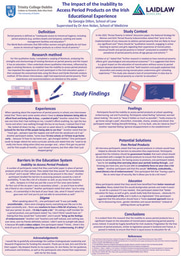
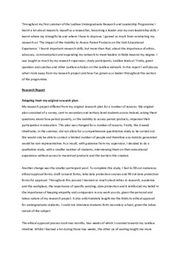
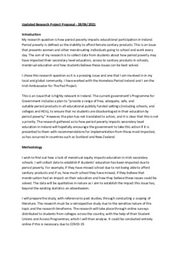
Please sign in
If you are a registered user on Laidlaw Scholars Network, please sign in